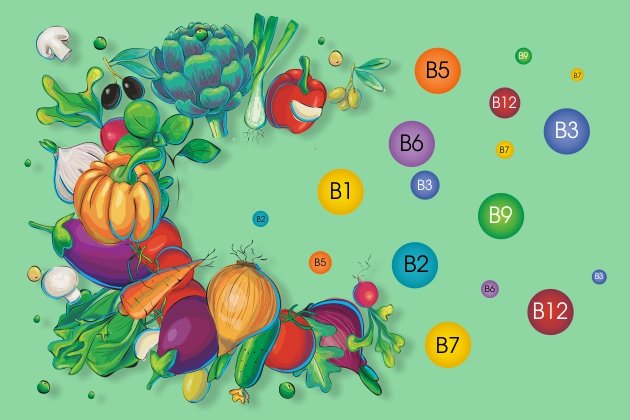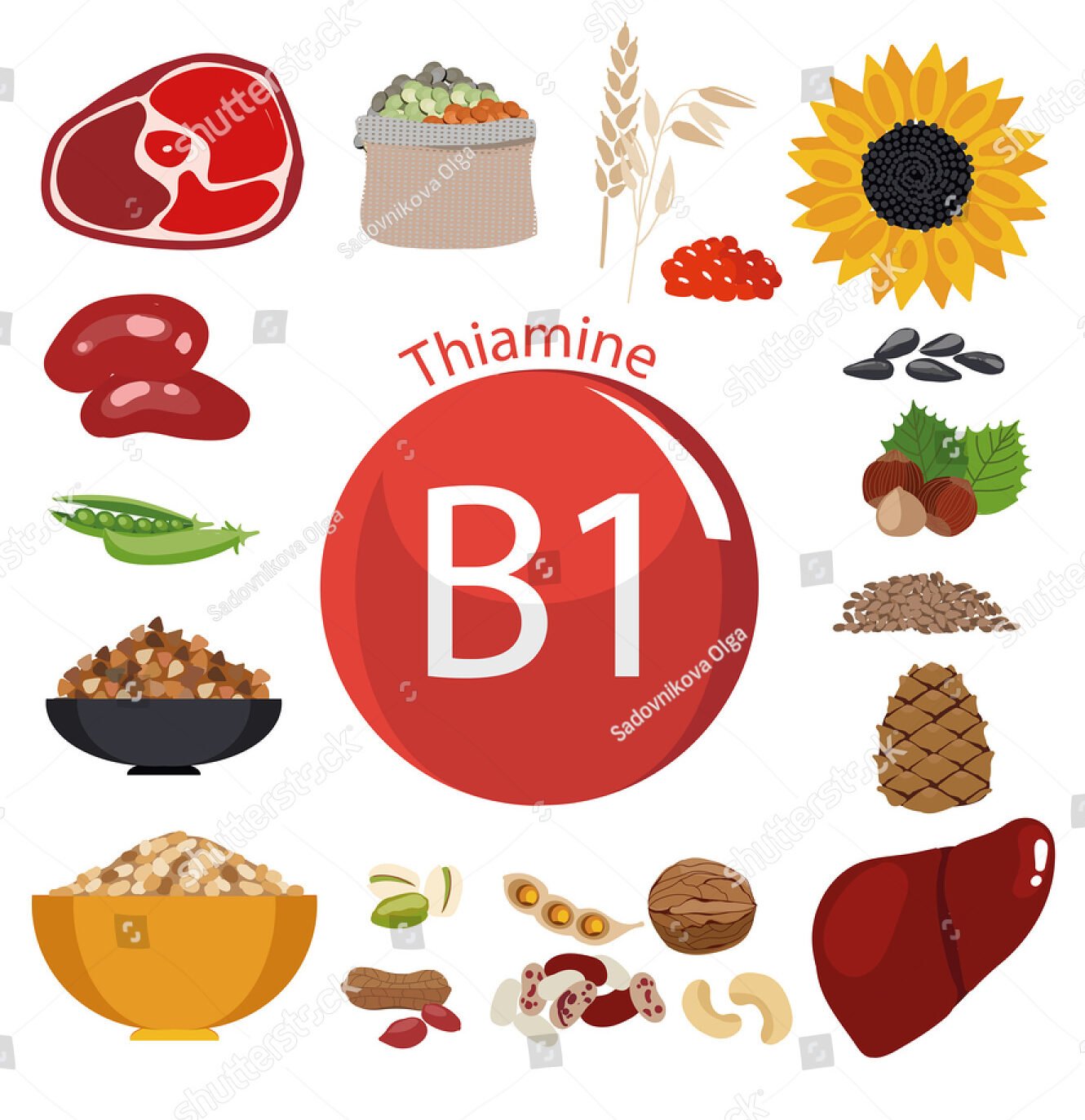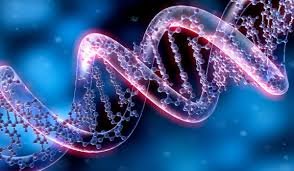When you become aware of the vast number of serious health issues that can arise due to a deficiency in Vitamin B Complex, you may feel compelled to rush out and start taking supplements.
While that response is understandable, our aim here isn’t to alarm you, but rather to inform and educate. Knowledge about Vitamin B Complex deficiency empowers you to take proactive steps to protect your health.
What Is Vitamin B Complex?

Vitamin B Complex refers to a group of eight essential water-soluble vitamins that work together to support a range of vital bodily functions. These include:
-
Vitamin B1 (Thiamine)
-
Vitamin B2 (Riboflavin)
-
Vitamin B3 (Niacin)
-
Vitamin B5 (Pantothenic Acid)
-
Vitamin B6 (Pyridoxine)
-
Vitamin B7 (Biotin)
-
Vitamin B9 (Folic Acid)
-
Vitamin B12 (Cyanocobalamin)
These vitamins are often studied as a “complex” because they share similar sources, functions, and deficiency symptoms.
Why Is Vitamin B Complex Important?
Vitamin B Complex plays a vital role in more than 500 biochemical reactions in the body. Here are its key functions:
-
Energy metabolism (converting food into energy)
-
Regulation of brain and nerve function
-
Synthesis of RNA and DNA (genetic material)
-
Formation of red blood cells
-
Maintenance of healthy skin, hair, and eyes
-
Supporting cardiovascular and cognitive health
Signs and Symptoms of Vitamin B Complex Deficiency
Deficiencies in Vitamin B Complex can manifest in a range of physical and psychological symptoms, often overlapping in presentation. Common signs include:
-
Persistent fatigue and weakness
-
Irritability and mood swings
-
Poor memory and concentration
-
Tingling or numbness in hands and feet
-
Anemia (low red blood cell count)
-
Cracked lips, swollen tongue, mouth ulcers
-
Dry skin, brittle hair, and poor wound healing
-
Digestive issues and appetite loss
In pregnant women, a deficiency can lead to birth defects, especially related to neural development. Severe deficiencies can cause blood clots, paralysis, and even heart failure.
Who Is at Risk of Vitamin B Complex Deficiency?
Certain groups are more prone to Vitamin B Complex deficiency due to lifestyle, dietary choices, or health conditions:
1. Alcohol Consumers
Chronic alcohol intake inhibits the absorption and effectiveness of B vitamins, especially B1 (Thiamine), often leading to severe deficiencies.
2. Vegetarians and Vegans
Vitamin B12 is almost exclusively found in animal products. Those following strict vegetarian or vegan diets without supplementation are at high risk.
3. Pregnant Women
During pregnancy, the body’s requirement for B vitamins increases significantly. Without proper supplementation, deficiencies can develop.
4. People with Digestive Disorders
Conditions such as celiac disease, Crohn’s disease, or gastric bypass surgery can impair nutrient absorption, increasing deficiency risk.
Understanding Water-Soluble Vitamins
One key characteristic of B vitamins is that they are water-soluble. This means:
-
They are not stored in the body and must be consumed daily.
-
Excess amounts are excreted through urine.
-
Over-washing or overcooking vegetables can lead to vitamin loss.
To preserve these nutrients:
-
Avoid soaking cut vegetables.
-
Use the water from boiled veggies in soups or sauces.
-
Cook with minimal heat and try to eat some vegetables raw or lightly steamed.
In-Depth Look at Each B Vitamin
Vitamin B1 (Thiamine)

Function: Supports energy metabolism and nerve function.
Deficiency Signs: Fatigue, nerve damage, muscle weakness, and mental confusion. Severe deficiency can cause Wernicke-Korsakoff syndrome.
Sources: Whole grains, legumes, nuts, seeds, pork, and fish.
Vitamin B2 (Riboflavin)

Function: Aids in energy production and acts as an antioxidant.
Deficiency Signs: Cracked lips, sore throat, and skin disorders.
Sources: Milk, eggs, meat, green leafy vegetables, almonds, and fortified cereals.
Note: Sunlight can destroy riboflavin in transparent milk containers. Use opaque bottles.
Vitamin B3 (Niacin)

Function: Helps maintain healthy skin and nerves, and lowers cholesterol levels.
Deficiency Signs: Pellagra, which includes diarrhea, dermatitis, and dementia.
Sources: Poultry, fish, beef, whole grains, peanuts, and legumes.
Vitamin B5 (Pantothenic Acid)
Function: Essential for fatty acid metabolism and hormone production.
Deficiency Signs: Rare but may include fatigue, insomnia, and numbness.
Sources: Whole grains, avocados, yogurt, eggs, and meat.
Vitamin B6 (Pyridoxine)
Function: Crucial for brain development, immune function, and red blood cell production.
Deficiency Signs: Depression, irritability, confusion, weakened immune response, and anemia.
Sources: Bananas, potatoes, peas, spinach, poultry, and fish.
Vitamin B7 (Biotin)
Function: Promotes healthy hair, skin, and nails; supports metabolism.
Deficiency Signs: Hair thinning, skin rashes, and brittle nails.
Sources: Eggs, nuts, seeds, sweet potatoes, and liver.
Vitamin B9 (Folic Acid)
Function: Essential for cell growth and DNA formation.
Deficiency Signs: Fatigue, anemia, and neural tube defects in babies.
Sources: Leafy greens, citrus fruits, beans, and fortified grains.
Note: Pregnant women are advised to take folic acid supplements to prevent birth defects.
Vitamin B12 (Cyanocobalamin)
Function: Maintains nerve health, aids in red blood cell production, and DNA synthesis.
Deficiency Signs: Fatigue, memory loss, balance problems, anemia, and neurological issues.
Sources: Meat, fish, poultry, eggs, milk, and dairy products.
Note: Only animal sources contain B12 naturally. Vegans should consider supplements.
Factors That Affect Absorption of B Vitamins

Certain medications and health conditions can interfere with the absorption of B vitamins:
-
Acid reflux medications can reduce stomach acid, which is essential for B12 absorption.
-
Metformin, a diabetes medication, can interfere with B12 absorption.
-
Alcoholism and gastrointestinal diseases impair absorption of several B vitamins.
How to Prevent Vitamin B Complex Deficiency
Here are some effective ways to ensure your body gets enough B vitamins:
-
Eat a balanced diet rich in whole grains, lean meats, eggs, dairy, legumes, nuts, seeds, and leafy greens.
-
Avoid overcooking or washing vegetables unnecessarily.
-
Include fortified foods if you are on a restricted diet.
-
Consider supplements if you fall into a high-risk category (e.g., pregnant, vegetarian, elderly).
-
Limit alcohol consumption.
-
Consult a doctor if you are on medications like metformin or antacids.
Final Thoughts
Vitamin B Complex deficiency is more common than many people realize. The symptoms often develop slowly and can be easily mistaken for other health issues. However, the consequences can be serious if left unaddressed.
Fortunately, prevention is simple. A diverse and nutrient-rich diet can go a long way in maintaining optimal levels of all B vitamins. For those with higher needs or at risk of deficiencies, supplements may be necessary under a doctor’s guidance.
Taking care of your Vitamin B Complex levels isn’t just about preventing deficiency—it’s about optimizing your overall well-being. From energy levels and brain function to heart health and immunity, these vitamins truly are essential.
Stay informed, eat well, and take steps to maintain your health today and in the future.